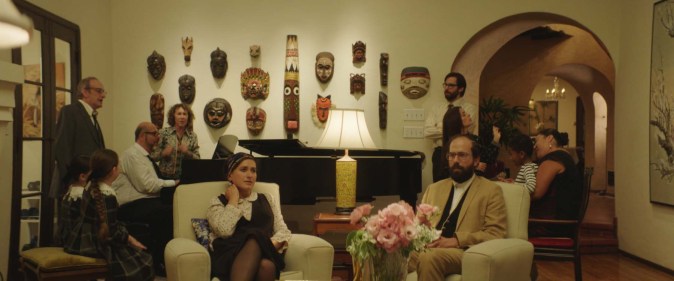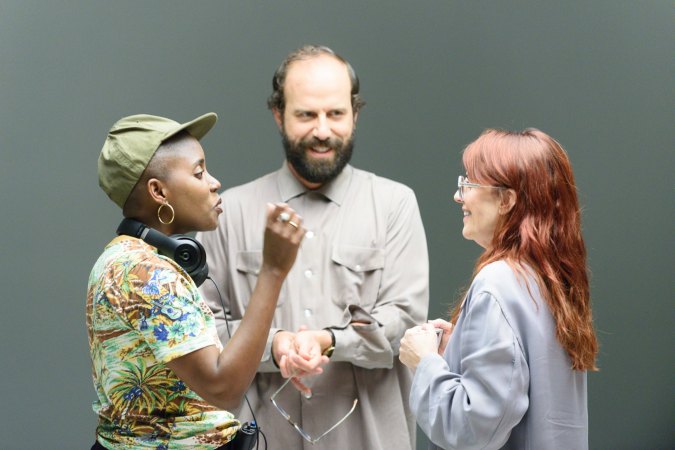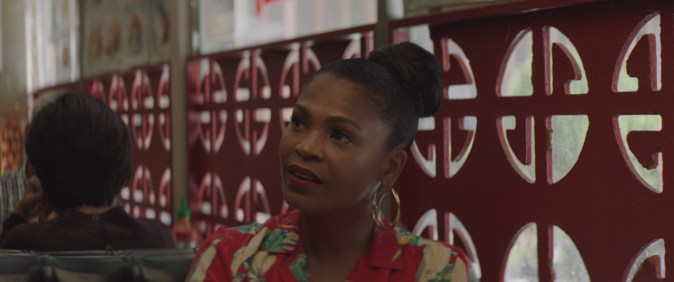Asserting that discomfort can be a source for a very peculiar type of humor, Panamanian-American director Janicza Bravo has amassed a body of work that gravitates towards unlikeable characters, their failures, their frustrations, and how they project them into the world, which, in their self-centered minds, has wronged them. Hers is a singular brand of comedy that is equal parts fascinating, off-putting, challenging, and very honest. Short films like Sundance-winning, Gregory Go Boom, paved the path for her first feature, Lemon, starring long-time collaborator, Michael Cera, and her spouse and co-writer, Brett Gelman.
Thoroughly sour as its title implies, Bravo’s full-length debut, which premiered at Sundance 2017 in the NEXT category, observes its protagonist – an inept, jealous, and vengeful white guy – as his fragile personal and professional life crumbles. Isaac (Gelman) is an aspiring actor with a estranged girlfriend who is blind and much more self-sufficient than him, a family that doubts his talent, and not a single meaningful relationship. Unfortunately for him, as opposed to narratives where the slacker gets ahead, finds redemption, and gets the girl, in Lemon mediocrity is not rewarded and doesn’t get him far.
Bravo’s influences come from her work in theater, her days as a stylist, and her upbringing in Panama. Like the motivations and ideas in her work, her cultural identity have been questioned, and though she considers herself a Latina, more often than not, the Latino community is not so accepting of her Afro-Caribbean roots. The overachieving filmmaker confessed she was pleasantly surprised when asked to chat with Remezlca, and delved into her heritage, her distinct sense of humor, and her excitement to write her next film mostly in Spanish.
Lemon opens at Los Angeles’ Nuart Theater on August 18 and in New York and other cities on August 25.

On the Long Journey of Making a Darkly Funny First Feature
“There is a lot of racial discourse in this story and films like these that are made by white guys don’t touch anything racial.”
I wrote the first draft of the feature five years ago. I wrote it with my partner Brett Gelman and we’ve been trying to make it for the last five years. My sense of humor is kind of particular. It’s a little bit dark. Maybe I make sad comedies or stressful comedies. It’s a particular brand. It’s niche the thing that I’m exploring or exorcising. It took that long to make it because I’m throwing my hat in a ring where there isn’t necessarily a page or a vocabulary for the thing that I’m trying to do.
On Making Her Own Version of a White-Dude Comedy
My humor is particular and Brett’s humor is particular. I made this movie because to me when I was looking to move into comedy there seemed to be an unspoken genre by my cotemporaries of white dude comedies: a guy in his late 30s, early 40s who is floundering and failing at life and then everything seems to work out for him. Lemon is my offering of this space and nothing works out for this guy. It’s also a story of plateau and it’s a conversation with privilege and mediocrity.
On Why Lemon is a Urine-Soaked Movie
Design really matters to me in storytelling, both photographically and aurally. With one imperfect harmony you have a beautiful song. When talking to my production designer, my costume designer, and the colorist, we talked a lot about how the movie opens with our protagonist’s body failing on him and it closes with his body failing on him. In terms of a piece that is urine-soaked, I felt that even though that’s how the film is bookended, there is a king of inability to break through that happens in the entire piece, through and through, it’s like layered urine or a layer of yellow that is in the film and gives it this sort of murkiness and stagnation.

On Her Experience in Theater Shaping the Way She Makes Films
Without fail it influences what I do. My background in theater is really important for me. I’m so grateful for it and I really do hope to be able to return to the theater sooner rather than later as a director. I would say the most obvious is probably the way things are framed or blocked. I prefer to shoot things proscenium and a lot of things play out in a wide, there is no great deal of coverage. In theater we don’t have an out, everything is in front of you, so I tend to work with having everything be in front of me. For directing and for actors playing it’s really fun to do scenes in full without all this progressive editing, to be able to perform something with an arch is really very fulfilling for the performer and also for the director.
On How Growing Up in Panama and the US Influences Her Work
In this movie, the aspect of my culture that is most clear is the Caribbean side of my culture. My parents are both Panamanian. I’m first generation, I was born in America, but I moved to Panama when I was baby. I lived there until I was 13. Spanish is my first language. And while there isn’t an obvious Latinness throughout the film, me, Janicza, as a person of color, as a Latin woman, as a Jewish woman, as a woman, my feelings are in the movie through and through. This is the story of a white man, and I get asked a lot about, “As a black woman how do you tell the story about a white guy,” and it’s like, “Well, this is a story about feelings.” I have a great deal of feelings, and my feelings and my experiences are in the movie: how I’m treated, how I’m not treated, and my feelings of not belonging, all of that is in the film. I would say that while there isn’t a clear ode to Panama, who I am and where I come from is very much woven into the tapestry.

On Writing Her Next Film in Spanish
“I don’t feel like other Latinos often see me as Latina, which is incredibly painful.”
I’m actually working on a film with a company called Cinereach that is set in Panama and more than half of it is in Spanish. I go to Panama every one or two years anyway, but going back now with the intention of making something there has been a great exercise, and also to write in Spanish, which I haven’t done since I was very young. It’s a celebration of the place that I am from. I’ve only really been writing as a filmmaker for about seven years, so I’ve not written in Spanish in those seven years. It’s exciting to be writing in Spanish in this film space.
On How Her Experience as a Woman of Color Seeps Into Lemon
Every maker is going to tell from their perspective or is going to use their experience to tell. I never thought, “Do things not work out for Isaac because they don’t always work our for me as a black woman.” I hadn’t really thought about it in that way. I think that things specifically don’t work out for Isaac because the story of privilege and mediocrity is one that should not work out. There is a lot of racial discourse in this story and films like these that are made by white guys don’t touch anything racial. I would say that’s probably the loudest thing that feels particularly different, but with intention the film also navigates love, career, and family, which those movies tend to do. In our story you see how our protagonist fails at each.
On Whether Things Have Gotten Better For Female Directors of Color
I think yes and no. I’m sure for people who think it hasn’t, it’s because it’s not moving fast enough. Six years ago when I was saying that I wanted to be working in this space as a director nobody was asking if I thought they were enough opportunities for women of color. Because we are talking about it and because it’s in the zeitgeist, it makes me feel like there is something bubbling. We had a premiere on Friday and after, when I met some of the audience members, there were at least five young black girls who said to me that they were trying to be filmmakers. Six years ago I didn’t have that. I hope that it is changing and I think that it is. The fact that I exist and I was able to make this movie is proof that it’s possible. But the length of the road is the issue. It’s hard for women to make first features. It’s really hard for them to make second features. I can’t really speak to that, I think after my next feature we should revisit this conversation.

On the Lack of Afro-Caribbean Inclusion in the Latino Community
If I’m being completely honest when I got the schedule for this week and I saw that I was doing an interview for Remezcla I was pretty surprised, because I don’t feel welcomed or invited to Latin culture very often. I feel that when we talk about the Latin diaspora, particularly in America, we are talking about people that don’t look like me. I don’t feel included in that conversation. When people that do look like me are included, it’s Celia Cruz or the Buena Vista Social Club [laughs].
I don’t feel like other Latinos often see me as Latina, which is incredibly painful, but I’ve also lived in America for a really long time and I have found myself assimilating to African-American culture. Unless I am going to get into a longer conversation with somebody, people assume I’m African-American all the time, and I won’t say that I’m not because it’s easier for me to be accepted by that culture. Also because I would have to explain to them why I’m not. I find myself in this interesting pocket where I culturally and ethnically feel very Latin, and in living in America I find myself identifying with African-American culture or black culture. Although I don’t call myself African-American, people do call me that and I don’t tell them that they are wrong.
It’s such a long conversation but I think it’s really about how I choose to see myself and I know what I am. I feel pretty comfortable and safe with that. My people know who I am. So I was excited to be included in Latin culture this time, because that’s how I see myself. It’s rare that I get invited, also because with Latin and black stuff when the work does not feature those people there is sometimes a disconnect. If I was making work where my protagonist was Latin or black, I think it would also be easier for me to be invited into those spaces. I think it’s sort of confounding when my face is black and the work feels white.




